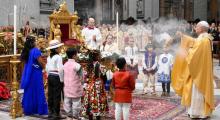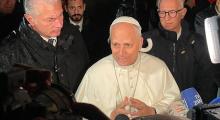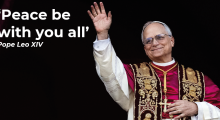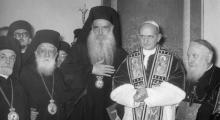Issued by the Catholic Center for Studies and Media - Jordan. Editor-in-chief Fr. Rif'at Bader - موقع أبونا abouna.org
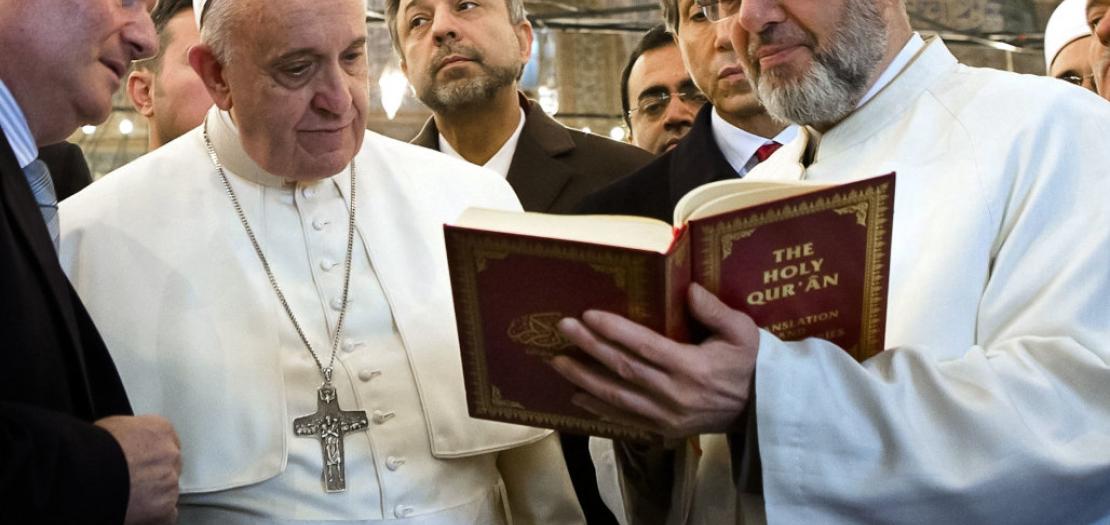
Once Pope Francis embarks on his trip to Panama to celebrate the Catholic Church’s World Youth Day on January 23, it’s essentially off to the races. For the rest of the spring, he’ll have a jam-packed papal itinerary that will focus heavily on dialogue with the Islamic world.
In a recent interview with the Italian broadcast network TV2000, Vatican Secretary of State Cardinal Pietro Parolin said Christian-Muslim relations has been a priority for Francis since the beginning of his papacy and it will continue to be a priority in 2019, seen mostly through trips the pope is taking to Islamic countries.
“The Pope’s attention toward the Arab world is due to the difficulties which today are found in relations between Christianity and Islam, with the tragic drifts of terrorism and religious fundamentalism,” Parolin said in the interview.
“Faced with this situation the Pope from the beginning of his pontificate has sought to promote encounter,” he said, adding that Francis is in many ways “characterized by this desire to promote encounter against every indifference. This is the meaning of the attention he will be giving this year through his trips to the Arab world.”
Francis’ keen attention to Catholic-Muslim relations was showcased by the fact that his first international trip after being elected to the papacy in 2013 was a May 2014 visit to the Holy Land. Since then, dialogue with Islam has continued to be a strong emphasis for the Pope in his travels, including a visit to Turkey in November 2014, to the Central African Republic in 2015 and to Egypt in the spring of 2017, all of which have a Muslim majority.
It was during his stop in the Central African Republic’s capital of Bangui that Francis decided to inaugurate his Jubilee of Mercy early, opening the holy door of the city’s cathedral a full week before the jubilee was officially set to begin in Rome.
Francis’ looming February 3-5 trip to the United Arab Emirates and subsequent outing to Morocco March 30-31 are further signs that dialogue with the Islamic world will continue to be a strong priority.
In a statement announcing the Pope’s visit to the UAE, former Vatican spokesman Greg Burke said the trip “shows the fundamental importance the Holy Father gives to inter-religious dialogue. Pope Francis visiting the Arab world is a perfect example of the culture of encounter.”
Yet this interest in dialogue with Islam is not something that began with his election, but it goes back to his time in Argentina. Even as Archbishop of Buenos Aires, the future Pope fostered strong ties with both the Jewish and Islamic communities.
The then-Archbishop Bergoglio made at least three visits to the Centro Islamico - the Islamic Center - of Buenos Aires and met frequently with Omar Abboud, the leader of Buenos Aires’ Islamic community, leaving a clear impression that he wanted the Catholic and Muslim communities to be partners.
In 2010 he co-authored a book with his friend Rabbi Abraham Skorka, rector of the Latin American Rabbinical Seminary in Buenos Aires. Both Skorka and Abboud were invited by the now-Pope Francis to be part of his formal delegation during his visit to the Holy Land in 2014, and they were also both present for his 2015 trip to Philadelphia for the World Meeting of Families.
They were also both present at a June prayer event in the Vatican gardens with Orthodox Patriarch Bartholomew of Constantinople, former Israeli President Shimon Peres and Palestinian President Mahmoud Abbas to pray for peace between the two nations.
A visible sign of this thawing in relations can be seen in the Vatican’s restoration of dialogue with the prestigious al-Azhar Mosque and university in Egypt. The Imam of al-Azhar, currently Ahmed al-Tayyeb, is considered by some Muslims to be the highest authority in Sunni Islam.
These improved relations between Islam and Catholicism are undeniably due at least in part to Francis’ frequent amicable remarks about Islam and his insistence that not all Muslims are terrorists. In a March 2017 speech to popular movements, for example, Francis famously said: “Muslim terrorism does not exist…there are fundamentalist and violent individuals in all peoples and religions.”
In a speech to the diplomatic corps accredited to the Holy See on Monday, January 8, Francis said his visits to the UAE and Morocco “represent two important opportunities to advance interreligious dialogue and mutual understanding between the followers of both religions in this year that marks the 800th anniversary of the historic meeting between Saint Francis of Assisi and Sultan al-Malik al-Kāmil,” the fourth sultan of Egypt.


